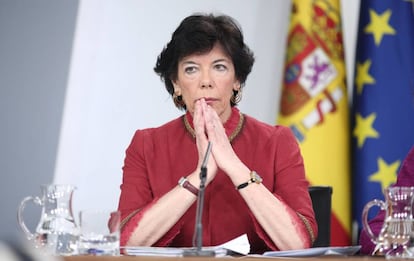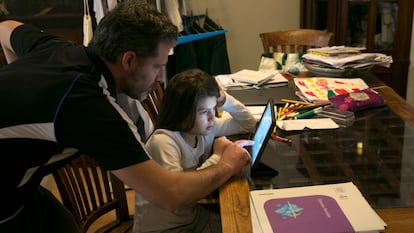Spanish students to get a passing grade due to coronavirus confinement
Education officials will let teachers award varying scores depending on performance during first two terms

The Spanish Education Ministry on Wednesday reached an agreement with regional governments to grant a passing grade to all students in early education, primary, secondary and the first year of pre-university studies.
Spanish children have been confined to their homes for a month due to the coronavirus pandemic, and schools have been scrambling to roll out virtual teaching tools and online classes with varying degrees of success. Not all schools have the same resources, and educators have expressed concern that students in families with no access to technology could be left behind.
On Wednesday, authorities decided that all students will automatically get a passing grade this academic year but that teachers must decide the exact scores each child gets, based on how well they did during the first two terms.
An estimated 10% of school children do not have home access to the technology required to do online coursework
Some students could still fail specific subjects and get tested for them again in the fall, but no student will be held back a year because of it, with very few exceptions that will require approval from regional authorities.
Students in their second year of Bachillerato, which is prior to university, will not be subject to these guidelines, but they will nevertheless receive an overall passing grade even if one teacher is opposed to it. The national university entrance exams will be simplified this year to take into consideration the exceptional situation.
These decisions affect 8.2 million non-university students forced to do their classwork from home due to the nationwide school closures. An estimated 10% of them do not have home access to the technology required to do online coursework.
A recent survey of over 3,000 school teachers conducted by the University of Granada shows that a majority rejects the notion of a passing grade for everyone without regard for the scores of the first two terms. “The data shows that educators reject automatic promotion because they value effort, personal merit and fairness .... if there is one thing that they all agree on, it is that they want to be fair to their students,” said Fernando Trujillo, who teaches education at the University of Granada and has co-written a study on the impact of Covid-19 on school evaluations.

Some education groups and experts are already asking for schools to remain open this coming summer – if the health conditions allow it – so that students who require extra help can take classes, engage in sports activities and have access to the school cafeteria.
“Many families lack the digital devices and the skills and the cultural background required to help their children with distance education. We are risking seeing a lot of kids dropping out of the system,” said Álvaro Ferrer, a researcher at the non-profit group Save the Children.
Education authorities are planning to hire extra teachers in order to roll out these summer courses, it emerged on Wednesday after Education Minister Isabel Celaá held a virtual meeting with regional education chiefs.
Another proposal involves launching programs during the academic year 2020-2021 to help students with special needs or with low grades get through their subject matter.
Ending confinement for kids
Child psychiatrist José Luis Pedreira, who sits on the Health Ministry’s advisory board, has been designated the task of coordinating the end of the confinement period for Spanish children.
Pedreira, who heads a group of eight experts drafting a report on how to enable children to go outside safely, says the relaxation of confinement measures will require a precise plan and the willingness to comply with it.
“It is a very complex situation, and we need to go step by step,” he said, refusing to discuss dates. “Safety distances must be respected, children should not touch street furniture, and they should be in the company of an adult who takes responsibility for the outing.”
English version by Susana Urra.
Tu suscripción se está usando en otro dispositivo
¿Quieres añadir otro usuario a tu suscripción?
Si continúas leyendo en este dispositivo, no se podrá leer en el otro.
FlechaTu suscripción se está usando en otro dispositivo y solo puedes acceder a EL PAÍS desde un dispositivo a la vez.
Si quieres compartir tu cuenta, cambia tu suscripción a la modalidad Premium, así podrás añadir otro usuario. Cada uno accederá con su propia cuenta de email, lo que os permitirá personalizar vuestra experiencia en EL PAÍS.
¿Tienes una suscripción de empresa? Accede aquí para contratar más cuentas.
En el caso de no saber quién está usando tu cuenta, te recomendamos cambiar tu contraseña aquí.
Si decides continuar compartiendo tu cuenta, este mensaje se mostrará en tu dispositivo y en el de la otra persona que está usando tu cuenta de forma indefinida, afectando a tu experiencia de lectura. Puedes consultar aquí los términos y condiciones de la suscripción digital.








































